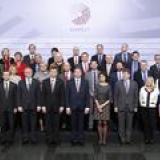
Pracovnoprávne vzťahy a sociálny dialóg
Pracovnoprávne vzťahy a sociálny dialóg sú jednou zo šiestich hlavných aktivít pracovného programu nadácie Eurofound na obdobie rokov 2021 – 2024. Eurofound bude naďalej pôsobiť ako odborné centrum pre monitorovanie a analýzu vývoja v systémoch pracovnoprávnych vzťahov a sociálnom dialógu na vnútroštátnej úrovni a na úrovni EÚ. Naďalej bude podporovať dialóg medzi sociálnymi partnermi, a to aj s ohľadom na vplyv pandémie COVID-19, pričom bude vychádzať z odborných znalostí siete korešpondentov nadácie Eurofound na vnútroštátnej úrovni.
V nasledujúcich štyroch rokoch Eurofound poskytne dôležité informácie o výzvach a perspektívach v oblasti pracovnoprávnych vzťahov a sociálneho dialógu v EÚ. S dlhoročnými odbornými znalosťami v tejto oblasti Eurofound skúma hlavný vývoj s vplyvom na aktérov, procesy a kľúčové výsledky pracovnoprávnych vzťahov. Porovnáva národné systémy pracovnoprávnych vzťahov vrátane národného sociálneho dialógu a kolektívneho vyjednávania . V nadväznosti na svoju databázu COVID-19 EU PolicyWatch vytvorenú v roku 2020 bude Eurofound monitorovať politické iniciatívy vlád, sociálnych partnerov a ďalších aktérov s cieľom zmierniť sociálne a ekonomické dôsledky krízy, ako aj pomáhať pri úsilí o obnovu. Budú pokračovať pravidelné správy o vývoji stanovenia odmien , minimálnej mzdy a pracovného času , ako aj o výsledkoch pracovného života.
Odborné znalosti nadácie Eurofound podporujú budovanie kapacít sociálnych partnerov na dosiahnutie účinného sociálneho dialógu a agentúra podporuje rozvoj európskeho sociálneho dialógu skúmaním reprezentatívnosti organizácií sociálnych partnerov v rôznych sektoroch s cieľom posúdiť ich oprávnenosť na účasť vo výboroch pre sociálny dialóg.
- Infografika: Pracovnoprávne vzťahy a sociálny dialóg v EÚ
„Sme tu, aby sme podporili dialóg medzi sociálnymi partnermi. Myslím si, že údaje, ktoré spoločne získavame, a výskum, ktorý robíme, je dôležitý, ak pomáha samotným aktérom fungovať lepšie… Živý sociálny dialóg je súčasťou toho, čo by sa dalo nazvať sociálne trhové hospodárstvo, ktoré sa Európska únia snaží dosiahnuť.“
David Foden, poradca, pracovnoprávne vzťahy


















